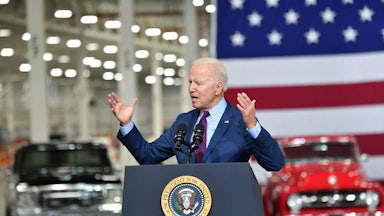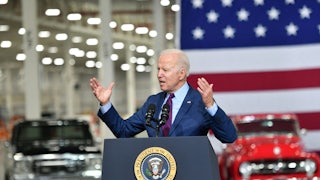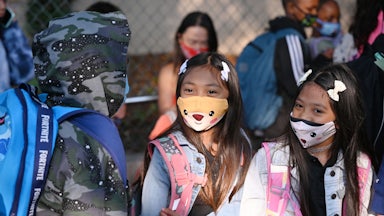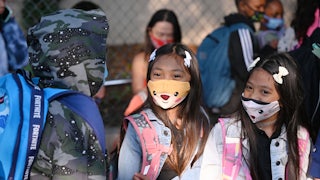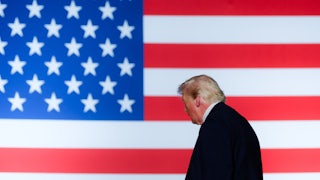For those of us anxious about climate change, last week felt like a lot. In addition to witnessing the ongoing present-day fallout of climate change worldwide through floods and fires, we got some scary news about the future. The Intergovernmental Panel on Climate Change (IPCC) came out with yet another report on the consequences humans will likely face if we fail to take sufficient action to curb emissions and protect the planet.
The report plainly stated that although all is not lost, extreme weather is now inevitable no matter where you live. The dire warnings circulated widely: “How Climate Change Kills the Future,” read an Axios headline. The Washington Post was equally blunt: “The Climate News Is About to Get a Lot Worse.” The 314 Action Fund, a climate action group, besieged me with email all week, admonishing, “We lost a decade in the fight to get a handle on the climate crisis.” An email from MoveOn told me that the report was a “code red for humanity”—a phrase from the report that appeared in many headlines—and urged me to get a sticker reading “The Earth Can’t Wait.”
Then there was this baffling tweet from one of the most powerful individuals in the world. “We can’t wait to tackle the climate crisis,” President Biden wrote. “The signs are unmistakable. The science is undeniable. And the cost of inaction keeps mounting.”
What do you mean by “we”? Isn’t the president of the United States in a better position than most of us to “tackle the climate crisis”?
Widespread public worry represents huge progress: It’s better than denying or ignoring the climate crisis, as many of our leaders and media outlets have done in the past. Yet the chatter around the IPCC report and the report itself still managed to be unhelpful, scaring us to death while missing an opportunity to galvanize us into action. It’s a common dilemma in climate activism—one activists, scientists, and politicians are going to have to get a lot smarter about if we’re to avert catastrophe.
The report failed as propaganda—and as basic information—in one glaring way: failing to name the enemy. As the writer Emily Atkin noted, the IPCC report and its summary for policymakers discussed “human” activity at length while saying very little about the fossil fuel industry. The report failed to unify potential readers against the relevant foe. Much of the media coverage replicated this problem.
It would be bad enough if the report and its chroniclers merely punted on identifying the bad guy in the climate change drama. But the psychological consequences are worse than that: By naming the enemy as ourselves—all humans—the report maximized the potential for self-reproach with no clear path forward. A Guardian headline, for instance, referred to the “IPCC report’s verdict on climate crimes of humanity: guilty as hell.” This framing makes us feel guilty just for existing, when it’s our existence that is at stake, and worth fighting for.
While the report is scientific and its credibility rests on the idea that the IPCC is not political, of course it is propaganda in the sense that the authors would like to persuade the readers to do something about the problem. (Propaganda has a sinister reputation, but that’s unfair—all collective projects require extensive persuasion, especially in a democratic society.) The IPCC warning might get better political results if the group acknowledged the propagandistic goal of the enterprise and simply produced better propaganda.
Fearmongering, while dangerous, can sometimes be effective if accompanied by a specific call to action. Vaccination rates are up in many places newly devastated by Covid-19 deaths and hospitalizations. Millions of people turned out to vote against Trump not primarily out of excitement over Joe Biden and the Democrats, but because they were afraid that the best parts of our world couldn’t survive a second Trump administration and that the worst parts could. Those not in swing states wrote postcards to swing-state voters, made phone calls, and knocked on doors for similar reasons. Some of the most successful recent appeals in public life have involved a clear enemy (a virus, a drug, Donald Trump) and a simple, specific action. Vote. Write postcards. Get a shot.
But naming an enemy can be risky if fear is emphasized at the expense of a positive message. During World War II, for example, the Roosevelt administration created and tested a variety of propaganda, hoping to convince the American public to support going to war against Nazi Germany and to make the sacrifices this war would entail. Initially, as historian James Sparrow has documented (and as I have discussed in a book on focus groups and persuasion), FDR’s Office of War Information, helped by social scientists at Columbia University, found that overemphasizing the badness of our enemy could backfire. Imagery and radio broadcasts by the U.S. government depicted the Nazis as bloodthirsty, demonic, barely human. The U.S. government then discovered, using early market research techniques including the very first focus groups, that these portrayals were too frightening. Focusing on the enemy’s depravity, especially the ruthless killing of civilians, tended to discourage Americans from wanting to fight the Nazis at all: Any sensible person would want to avoid a confrontation with such an enemy. In contrast, a more positive message, emphasizing American rationality and democracy, and optimism that we could prevail and work together, tended to carry the day.
We’ve seen the same problem with climate change: If we become too afraid, we’re paralyzed.
Much of the coverage and propaganda in the wake of the IPCC report seems to ignore these lessons of both the present and the past, doomsaying at loud volume while naming neither the enemy nor any specific course of action. The report itself does mention some ways we can avoid the apocalypse, and to the IPCC’s credit, the group will release a separate report on solutions later this year. Let’s hope that sequel gets at least as much attention as the apocalyptic dimensions of last week’s blast.
In fairness, some environmental groups sent emails and tweets urging action on specific environmental policies, including pressure on Biden’s EPA. On the Tuesday after the report came out, I got a text from the office of Congresswoman Alexandria Ocasio-Cortez, referencing the report and the “dire consequences” of climate change we’re facing. “We’re knocking on doors to talk about taking environmental action with our neighbors,” the text continued, inviting me to come to the Bronx and canvass for the Green New Deal and against the new power plant in Astoria. It was a deceptively simple but effective message: Things are bad, but you can help make them better.

